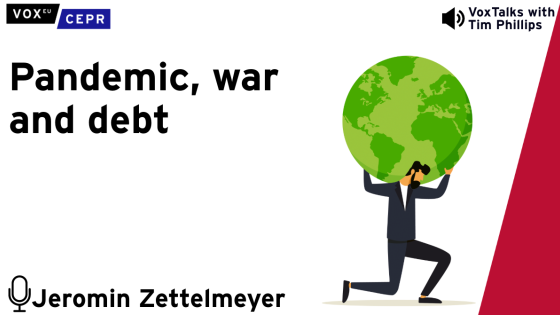We are pleased to announce that the full back catalogue of Vox eBooks is now available to purchase in print, with several titles also available for the Kindle. (The books will remain available to download for free on Vox).
Starting with The First Global Financial Crisis of the 21st Century in June 2008, Vox has published 12 titles with combined downloads of over 125,000.
The books are available through our UK distributors, Amazon and other major booksellers.
Vox on the “subprime crisis”
Vox was launched with the aim of enriching the economic policy debate by making it easier for serious researchers to make their contributions accessible to the public. The financial crisis, which boiled over in August 2007, was the perfect showcase for Vox’s unique approach.
In June 2008, after the "subprime crisis" erupted in the US but before the Lehman's failure, as the global financial markets began to show strains on a scale and scope not witnessed in the past three-quarters of a century, Carmen Reinhart and Andrew Felton brought together a selection of Vox columns looking at the origins of the crisis, how it was unfolding, and what could be done about it.
The resulting eBook, The First Global Financial Crisis of the 21st Century, was made available free of charge on Vox and has been downloaded over 25,000 times. A second volume followed in February 2009 and the contributions within them have proven to be the first drafts of the economics profession’s understanding of a crisis that was both deepening and widening.
A message to the G7/8
As the G7/8 leaders prepared to meet in October 2008 to craft their response to the unfolding crisis, Professor Barry Eichengreen of the University of California, Berkeley sent an email to Vox Editor-in-Chief Richard Baldwin with a proposal for another eBook. Invitations to contributors went out the same day with a deadline of 18 hours. Despite the short notice, the urgency of the unfolding crisis meant that most invitations were accepted. The following day Vox published Rescuing our Jobs and Savings: What G7/8 Leaders Can Do to Solve the Global Credit Crisis, a collection of 15 new essays by some of the world’s leading economists offering priorities for the crisis response. This eBook was the first collection of thinking on what was going on and what world leaders should do in response; this has been downloaded over 65,000 times.
As the global nature of the crisis began to come into focus and the seriousiness of the threat became clear, world leaders decided to use the G20 as a vehicle for crisis coordination (a meeting had long been scheduled for November 2008 in Washington DC). To help clarify the depth and internectedness of the crisis's threats, Eichengreen and Baldwin went on to co-edit What G20 Leaders Must Do to Stabilize our Economy and Fix the Financial System. Released ahead of the November 2008 G20 meeting in Washington, the eBook has been downloaded over 60,000 times. As with the G7/8 eBook, it was virtually the only collection of writings available at the time -- just weeks after the Lehman Brothers' bankrupcy.
The London Summit
The G20 London Summit on 2 April 2009 came at a perilous time for the international economy – advanced, emerging market and poor countries alike. The summit and the G20 process as a whole offered the prospect of concrete, implementable results that could restore confidence and lead the way to recovery. Macroeconomic Stability and Financial Regulation: Key Issues for the G20, edited by Mathias Dewatripont, Xavier Freixas and Richard Portes and published on Vox on 2 March 2009, brought together the papers presented at a seminar with G20 Deputies and private sector representatives hosted by HM Treasury and the Bank of England ahead of the London Summit.
Murky protectionism
One of the issues at the forefront of the G20 process was the threat of protectionism. The financial crisis prompted a sudden, severe, and synchronised collapse in world trade in late 2008 and led to worries over “murky” protectionism – seemingly benign, crisis-linked policies that are twisted to favour domestic firms, workers, and investors.
In The Collapse of Global Trade, Murky Protectionism, and the Crisis: Recommendations for the G20, edited by Richard Baldwin and Simon Evenett, leading trade policy practitioners and experts put forth several concrete proposals for the 2009 London Summit to let G20 leaders get out in front of the crisis and reduce the chance that an avalanche of murky protectionism could hinder the global recovery.
Another eBook later that year aimed to tell the world’s trade ministers what economists knew about the trade collapse ahead of a meeting at the WTO in Geneva.The two dozen papers in The Great Trade Collapse: Causes, Consequences and Prospects, edited by Richard Baldwin, established a consensus on what caused the collapse. In a nutshell, it was caused by the sudden postponement of purchases, especially of durable consumer and investment goods. Trade fell far more than GDP, since the demand shock was amplified by “compositional” and “synchronicity” effects
Global imbalances and the currency dispute
Those critical of global imbalances often blame the surplus countries and their currency manipulation. In The US-Sino Currency Dispute: New Insights from Economics, Politics, and Law, Simon Evenett brought together 28 chapters summarising the latest research on the behaviour of the renminbi and the role it has played in global imbalances.
The book was first published on Vox to coincide with the original April 2010 deadline for a US Treasury report determining whether the Chinese government was manipulating its currency. The report, finally released in July 2010, said that China’s currency is undervalued, but stopped short of claiming that China is manipulating its exchange rate. It appeared to bring a measure of calm to the debate, but this was short-lived and the controversy erupted again in September 2010.
The Eurozone and the crisis
The Eurozone’s life-threatening crisis was temporarily halted when its leaders and the ECB took strong measures in May 2010. But these were palliatives not a cure. The crisis was not over, according to the dozen world-renowned economists whose views are contained in Competing the Eurozone Rescue: What More Needs to Be Done? published in June 2010. Events in Ireland and, most recently, Portugal have proved them right.
The future of the Doha Round
After ten years of negotiations, WTO members met in Geneva on 29 April 2011 to choose between the politically expedient path of putting Doha on hold, and the leadership path of engaging constructively and creatively to break the deadlock in 2011. The contributions in Why World Leaders Must Resist the False Promise of Another Doha Delay – published the day before the meeting and edited by Richard Baldwin and Simon Evenett – argued that if Doha fails this year, it can’t be completed before 2020.



